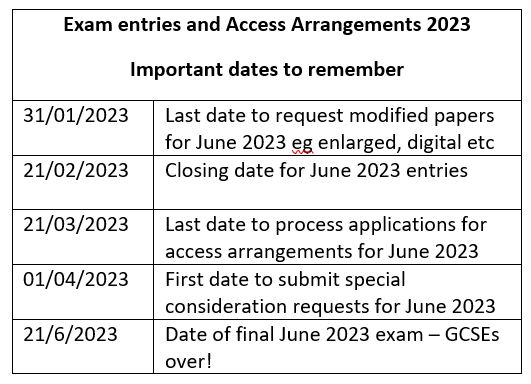Exams Access and Assistive Technology
Planning for the GCSE exams
The start of the Spring Term is when many schools start planning in earnest for GCSE exams. With Mock Exams just around the corner, this would seem to be a good time to take another look at Access Arrangements.
What are Access Arrangements?
‘Access Arrangements’ are special arrangements that allow candidates with special educational needs, disabilities or temporary injuries to access public examinations. Anyone with a special educational need or disability may be eligible for access arrangements in public exams, but they need to be planned and applied for in advance.
Some of the difficulties candidates experience that can be supported with an application for access arrangements are areas such as difficulties with reading, slow or illegible handwriting, memory issues, speech and language difficulties, visual perception or visual tracking, visual impairment or hearing impairment, slow rate of working or anxiety.
Can Assistive Technology be used in exams?
Students who use Assistive Technology or auxiliary aids such as specialist software, keyboards and adjustments are considered a reasonable adjustment under the Equality Act (2010) which could be applied to exams as part of their access arrangements in exams if it’s their normal way of working.
Assistive Technology used during exams makes sure that every student has an equal opportunity to show their knowledge and mastery to the best of their abilities to every other student. Any tool that a student already uses in a classroom environment may be approved for use during exams.
Some common AT access arrangements could be Computers, Audio Amplification, Text-to-Speech software, Speech-to-text technology, Screen magnifiers, Screen overlays, Word prediction technology and many others.
There is no hard and fast rule regarding what is permissible and what isn’t. The Joint Council for Qualifications explains that reasonable adjustments must be bespoke to the student. You can read more about JCQ guidance here.
Evidence checklist
The key before applying for access to these is to have plenty of evidence that this is the student’s normal way of working. Some good evidence of NWW is:
– Teacher’s records with a worked example for reference/ notes recorded in teaching plans
– Examples of individual student support plans
– Students’s classwork
– CENMAC Assessment and Reviews
– Check list for normal ways of working
– A guidance sheet where SenCo explains how they collect these records and put them together
– A staff training PowerPoint on Access Arrangements that is used with the teaching staff at my school to explain Access Arrangements, and how to complete the teacher records.
– A staff training sign-in sheet that you can use as evidence for JCQ to show training on Access Arrangements has taken place.
– A student’s EHCP
The most important thing to plan for, especially if there are several students in a school that will be applying for access arrangements for several students.
The key dates for upcoming deadlines for applications can be seen here.
You can view the JCQ deadlines or the whole year here.
Top Tips for using Assistive Technology in GCSE exams
Make sure students are very familiar with the technology, especially if they are using a separate ‘Exams Laptop’ they haven’t used before.
Ensure you have a trouble shooter in the room who knows the software when students first test it.
Ensure students use the tool as normal way of working, but also ensure that they practice using for exams by using their AT for internal assessments and mock exams as well.
If students will be using digital PDF exam papers, give them plenty of opportunities to practice using them before the real exam.
Students may need encouraging to ensure they stay with it (especially in the first instance).
The more it is used in classrooms the better and it is and more inclusive.
If students are using a ReaderPen, ensure that it is fully charged before the exam.
There will still be some students who need a human reader; therefore, the use of technology should always be considered on an individual basis.
Using technology requires preparation and time. Allow plenty of time to procure, set up and test the equipment well in advance.
Have a clear policy for which equipment will be used: will students have separate exam laptops? Do they have the correct software installed? etc
Plan who is responsible for ‘locking down’ laptops and disabling internet access.
Author: Maureen De Longhi, CENMAC Advisory Teacher






